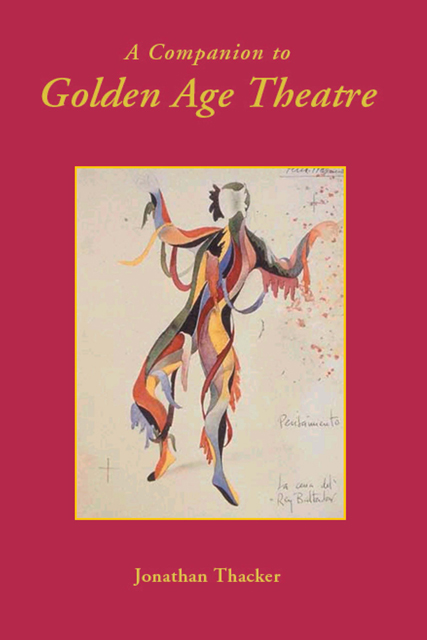Book contents
- Frontmatter
- Contents
- Dedication
- Foreword
- List of Abbreviations
- Introduction
- 1 The Emergence of the Comedia nueva
- 2 Lope de Vega
- 3 Cervantes, Tirso de Molina, and the First Generation
- 4 Calderón and the Comedia's Second Generation
- 5 Staging and Performance
- 6 Types of Comedia and Other Forms of Theatre
- 7 A Brief History of Reception
- Appendix 1 Verse Forms
- Appendix 2 English Translations of Golden Age Plays
- Suggestions for Further Reading
- Bibliography
- Index
3 - Cervantes, Tirso de Molina, and the First Generation
Published online by Cambridge University Press: 09 May 2023
- Frontmatter
- Contents
- Dedication
- Foreword
- List of Abbreviations
- Introduction
- 1 The Emergence of the Comedia nueva
- 2 Lope de Vega
- 3 Cervantes, Tirso de Molina, and the First Generation
- 4 Calderón and the Comedia's Second Generation
- 5 Staging and Performance
- 6 Types of Comedia and Other Forms of Theatre
- 7 A Brief History of Reception
- Appendix 1 Verse Forms
- Appendix 2 English Translations of Golden Age Plays
- Suggestions for Further Reading
- Bibliography
- Index
Summary
Among the many playwrights plying their trade in the early years of the development of the comedia nueva, was, as we saw in chapter 1, Spain's greatest writer, Miguel de Cervantes Saavedra. It was his works in prose, of course, which were to make Cervantes's reputation amongst his contemporaries and for posterity. He probably did have some success as a playwright, though, in the early days of the corrales and before Lope de Vega had begun to shape the comedia nueva, and his surviving drama deserves careful attention. Cervantes's failure later in life to have his plays performed has led to his characterization as a frustrated man of the theatre, bitter at the success of Lope's flawed but popular product. (In fact, had Cervantes captured the imagination of the play-going public in the 1590s and early seventeenth century, instead of Lope, there would have been profound repercussions for the development of the novel: Don Quijote and Sancho Panza might never have come to life, at least in the form of characters in a long prose work. As it is, Don Quijote can be described as theatrical in a number of respects, betraying a lasting fascination with the compact between audience and performance.) In the ten extant plays that certainly belong to Cervantes, we can discern a sharp intelligence and a frequently playful attitude towards the Lopean dramatic norms. We shall begin this chapter by looking at some of his representative later works.
The other playwrights whose works are mentioned or explored in this chapter are also contemporaries of Lope, who were heavily influenced by his dramatic practice, who travelled the same road, but possessed strong individual voices. They belong to the comedia nueva's first generation: their work could not have developed without Lope de Vega, and they must be seen as his disciples, although not slavish imitators by any means. Cervantes was the exception in not rapidly and enthusiastically taking up the model of the comedia nueva. His example proves that any who might have had aesthetic doubts about Lope's modus operandi, who were not broadly in step with his populist agenda, would have condemned their works to silence, at best a soulless existence on the page.
- Type
- Chapter
- Information
- A Companion to Golden Age Theatre , pp. 56 - 91Publisher: Boydell & BrewerPrint publication year: 2007



